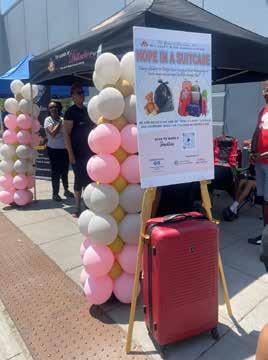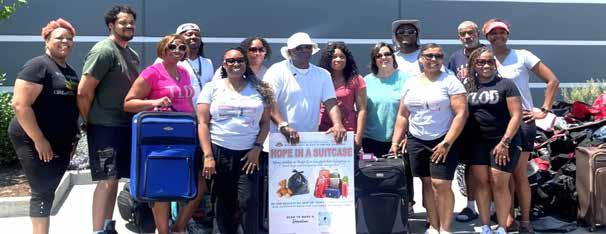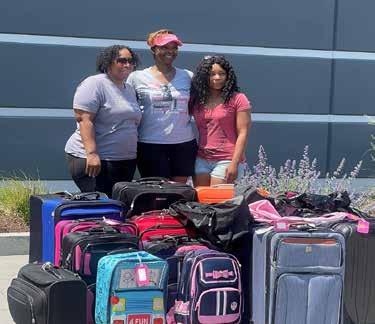
5 minute read
“Together
We Shine,” Coppertone and GirlTrek Partner to Promote Sun Safety and Wellness for Black Women
New Initiative advances
(Black PR Wire) Stamford, CT – Coppertone, a trusted name in sun protection, is proud to announce, “Together We Shine,” a sun health literacy and engagement program designed to meet the needs of multicultural consumers. Coppertone is partnering with GirlTrek, a nonprofit organization dedicated to promoting health and wellness through walking for Black women and girls. Together, they will promote a ‘wellness while walking’ message, improving sun safety and skin health awareness, while also advocating for physical activity in Black communities.
With a shared commitment to community empowerment and wellness, “Together We Shine” will focus on increasing awareness and education around the importance of sun protection for Black women who are at risk of developing sun damage and skin cancer. According to the Skin Cancer Foundation, Black patients are more than 3x as likely to be diagnosed with melanoma at a late stage than non-Hispanic white patients. The partnership will also encourage and support outdoor physical activity through the GirlTrek movement, which promotes walking as a simple, accessible form of exercise that can improve overall health and well-being.
“We’re thrilled to partner with GirlTrek at the start of sun season to raise awareness among Black women about the importance of sun protection,” said Rachael Field, Senior Brand Manager, Coppertone. “By offering new Every Tone sunscreen and dermatological health resources, we hope to have a positive impact on the journey of Black women’s health.”
GirlTrek Co-Founder Vanessa Garrison added, “We’re excited to see our community of Black women and girls continue to embrace sunscreen use as they’ll, in turn, influence others to adopt this healthy habit. We appreciate Coppertone’s support which will allow us to provide resources and education to our community around sun safety and physical activity, two critical areas.”
Coppertone is committed to designing inclusive, innovative products that meet a wide range of needs so that everyone can feel encouraged to seize the sun and see why It’s Great Outdoors. “Together We Shine” pro motes sun safety in multicultural communities in partnership with non-profit organizations who share Coppertone’s mission and vision. For more information, please visit www.coppertone.com.











Biden-Harris Administration Takes Action to Help Schools Deliver Critical Health Care Services to Millions of Students
On the Mental Health Awareness Day of Action, the Biden-Harris Administration took bold action to make it easier for schools to provide critical health care services, especially mental health services, for millions of students across the nation. These three significant actions support President Biden’s comprehensive national mental health strategy and deliver on his commitment to tackle the nation’s mental health crisis as part of his Unity Agenda. Through a series of new announcements from the U.S. Departments of Education (ED) and Health and Human Services (HHS), the Administration is continuing to take a whole-of-government approach to meet families where they are and ensure that children have access to the health care they need – especially mental health services.
Specifically, ED is proposing a new rule that would streamline Medicaid billing permissions for students with disabilities. ED predicts of the 500,000 new students who are found eligible under the Individuals with Disabilities Education Act (IDEA) Part B each year, nearly 300,000 are likely to be eligible for Medicaid and impacted by this rule. HHS is issuing new guidance to make it easier for schools to bill Medicaid. HHS also is approving requests from New Mexico and Oregon to expand health care services that schools can deliver to Medicaid enrolled students.
IDEA Act Notice of Proposed Rulemaking
ED is releasing a Notice of Proposed Rulemaking under IDEA that would streamline consent provisions when billing for Medicaid services provided through a student’s individualized education program (IEP). This would result in a uniform process applicable to all Medicaid enrolled children, regardless of disability.
Many children with disabilities receiving services under the IDEA are also enrolled in Medicaid either due to their disability status and/or based on their family income. Children with disabilities and are more likely to have low income, and those covered by Medicaid are more likely to have greater health care needs than those who are covered by private insurance. Further, the COVID-19 pandemic reduced access to critical services for children with disabilities and other vulnerable populations. To meet the Administration’s goal of increasing access to health and mental health services, and in fulfillment of the Bipartisan Safer Communities Act (BSCA) provision of expanding access to crucial school-based services for mental health and other care needs, it is crucial to remove barriers for schools so they can more easily provide Medicaid covered services to their students enrolled in Medicaid..
Importantly, the proposed changes announced today do not alter any of the critical parental consent provisions required by IDEA nor do they impact the parental consent obligations under the Family Educational Records and Privacy Act (FERPA). Additionally, the proposed rule does not alter the requirement that IEP services must be delivered at no cost to the child’s family, the requirement that IEP services cannot diminish other Medicaid-reimbursable services, nor Medicaid’s position as payor of first resort for IEP and Individualized Family Service Plan services. Rather, this regulatory change would help cut unnecessary red tape that schools and districts face in billing Medicaid and meet their obligations to ensure students with disabilities receive a free, appropriate public education in accordance with their IEP.
Guide to Expand School-Based Services for Millions of Students
HHS, through the Centers for Medicare & Medicaid Services (CMS) is releasing a comprehensive guide for Medicaid school-based services to make it easier for schools to deliver and receive payment for health care services to millions of eligible students. Developed in consultation with ED, the Comprehensive Guide to Medicaid Services and Administrative Claiming represents an important part of the Biden-Harris Administration’s implementation of the BSCA.
Medicaid and CHIP cover more than half of all children in this country. That’s more than 41 million children spending over 30 hours weekly in school during most of the year. This comprehensive policy guide helps states and schools leverage Medicaid and CHIP and offers a roadmap of how they can build a bridge between education and health care, including mental health care, to support children enrolled in these programs and help them thrive.
The guide clarifies, consolidates, and expands on a wealth of CMS guidance on how schools can receive payment for providing care for Medicaid- and CHIP-enrolled students, and how states can ease the administrative burden on school-based health providers to promote their participation in Medicaid and CHIP while meeting federal statutory and regulatory requirements. This includes helping states and schools operationalize:
How payments can be made for school-based services under Medicaid and CHIP;
How states can simplify billing for school-based services, including in rural and small or under-resourced communities, where care may be particularly challenging.
Examples of approved methods that state agencies have used to pay for covered services; and
How to enroll qualified health care providers to participate in Medicaid and furnish services within school settings.
In the months to come, CMS plans to release more resources to help ensure states can optimize children’s access to school-based services. As outlined by BSCA, these resources include $50 million in grant opportunities and a school-based services technical assistance center, in partnership with ED. For more information on the guide, visit Medicaid.gov.
These announcements collectively are part of the Biden-Harris Administration’s commitment to addressing the nation’s mental health crisis by providing more school-based resources and supports to help address students’ mental health needs. This announcement comes on the heels of ED’s announcement earlier this week on the latest tranche of awards to train school-based mental health professionals through the Mental Health Service Professionals demonstration program, which provided another nearly $100 million in awards as part of an overall appropriation of $1 billion in BSCA for school-based mental health services and supports.



